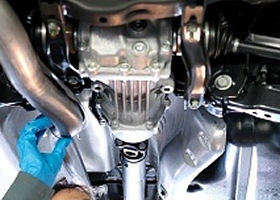The transmission is the part that moves your car
through the gears as it increases and decreases in speed. Transmissions
generally come in two types: Manual and Automatic.
Manual
Cars with manual transmissions (clutch/stick shift) usually cost less at
purchase than automatic transmission. They also use less fuel, are less
expensive to maintain, have better acceleration times, and make better
use of the engine’s power (which can be especially helpful for smaller
engine cars). Makes you wonder why so many of us drive automatics,
doesn’t it? The downside of manuals is that they require more effort to
learn, more work to drive and can be downright maddening in stop and go
traffic.
Automatic
Many drivers who want to be able to drink coffee on the way to work or
do other multi-tasking couldn’t live without the freedom that the
automatic provide, since the right hand and left foot are free during
driving. The manual requires the left foot to press the clutch and right
hand to operate the gear shift. The automatic also scores high when
compared to an improperly driven manual that can place undue stress on
the engine and drive train.
Recognizing problems
Typical symptoms of transmission problems
are:
.
Leaking Fluid: Park your car in a clear, clean area for 24 hours. Then
move the car and check for any evidence of liquid: drips or puddles. Red
fluid is typically transmission fluid and may mean that you have a leak.
Transmission fluid cools and lubricates the parts as they move. Low
fluid can cause the trans to overheat and/or parts to wear down. (NOTE:
Green may be antifreeze which is very poisonous to pets and children, and black
fluid is usually motor oil.)
.
Check Engine Light: The check engine light tells you that the car’s
internal computer detects a problem in one of the operating systems. It
could be the transmission, or it could be the engine, or exhaust, etc.
Better safe than sorry on this one. Get it in to see us as we have the
proper diagnostic equipment.
.
Something feels wrong: Grinding and shaking as you increase or decrease
speed or shift gears can be a symptom of a serious transmission problem.
.
Makes funny sounds: A transmission that is operating properly will not
make noises. If you hear whining or humming, it’s a problem. Get it
checked out. Note that the noises may only happen intermittently at
first but will happen more and more frequently over time.
.
Won’t go into gear: When an automatic transmission hesitates or has
issues engaging "Park" or "Drive" instead of shifting quickly into gear,
there's likely an issue with the transmission.
What we do:
-
Repair
Transmission
-
Replace
Transmission
-
Transmission
Fluid Flush
-
Transmission
Fluid Service
-
Remanufactured Transmissions
-
Manual
Transmission Clutches
-
Slipping and
Grinding
-
Leaks
|
 |